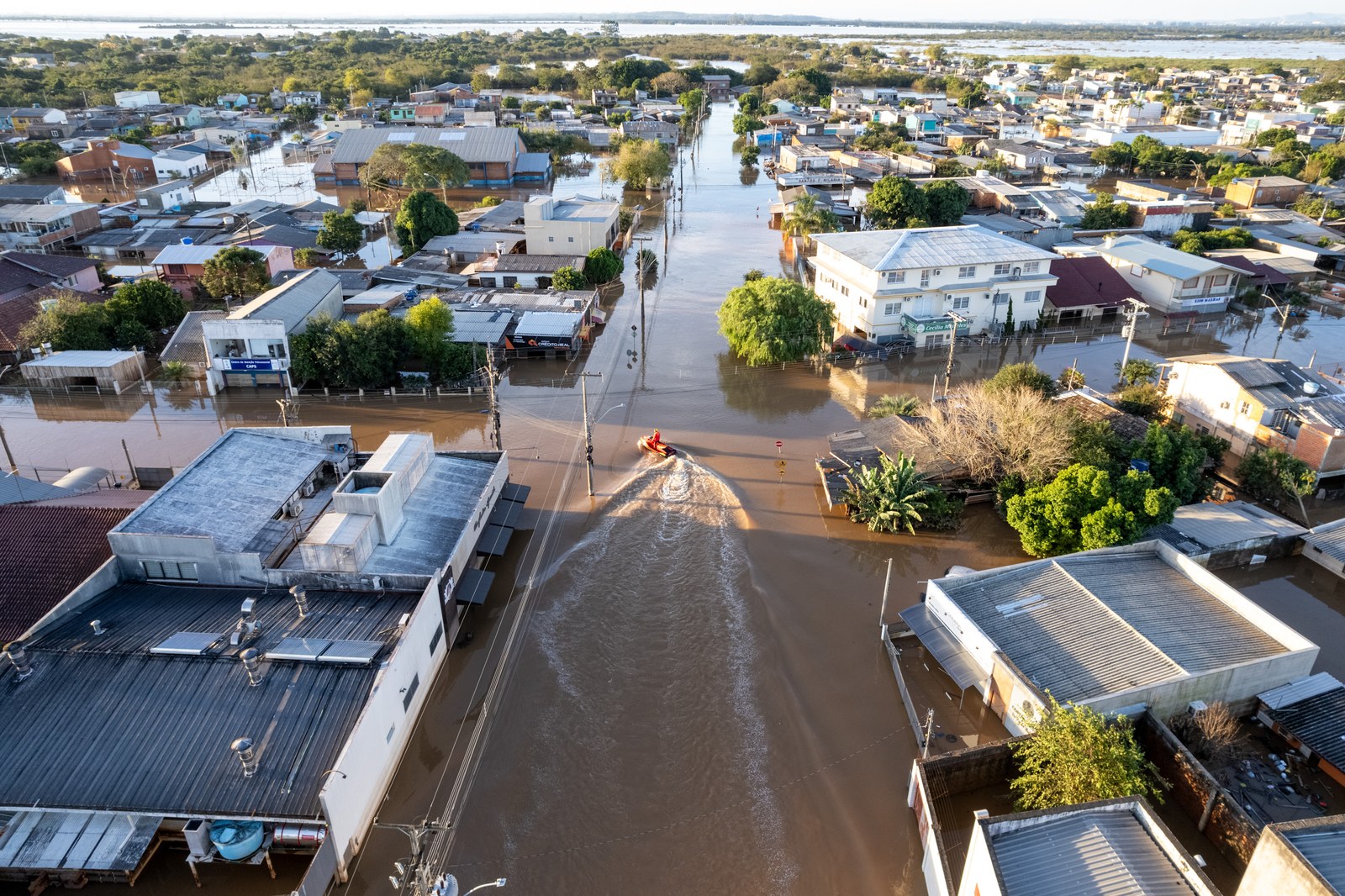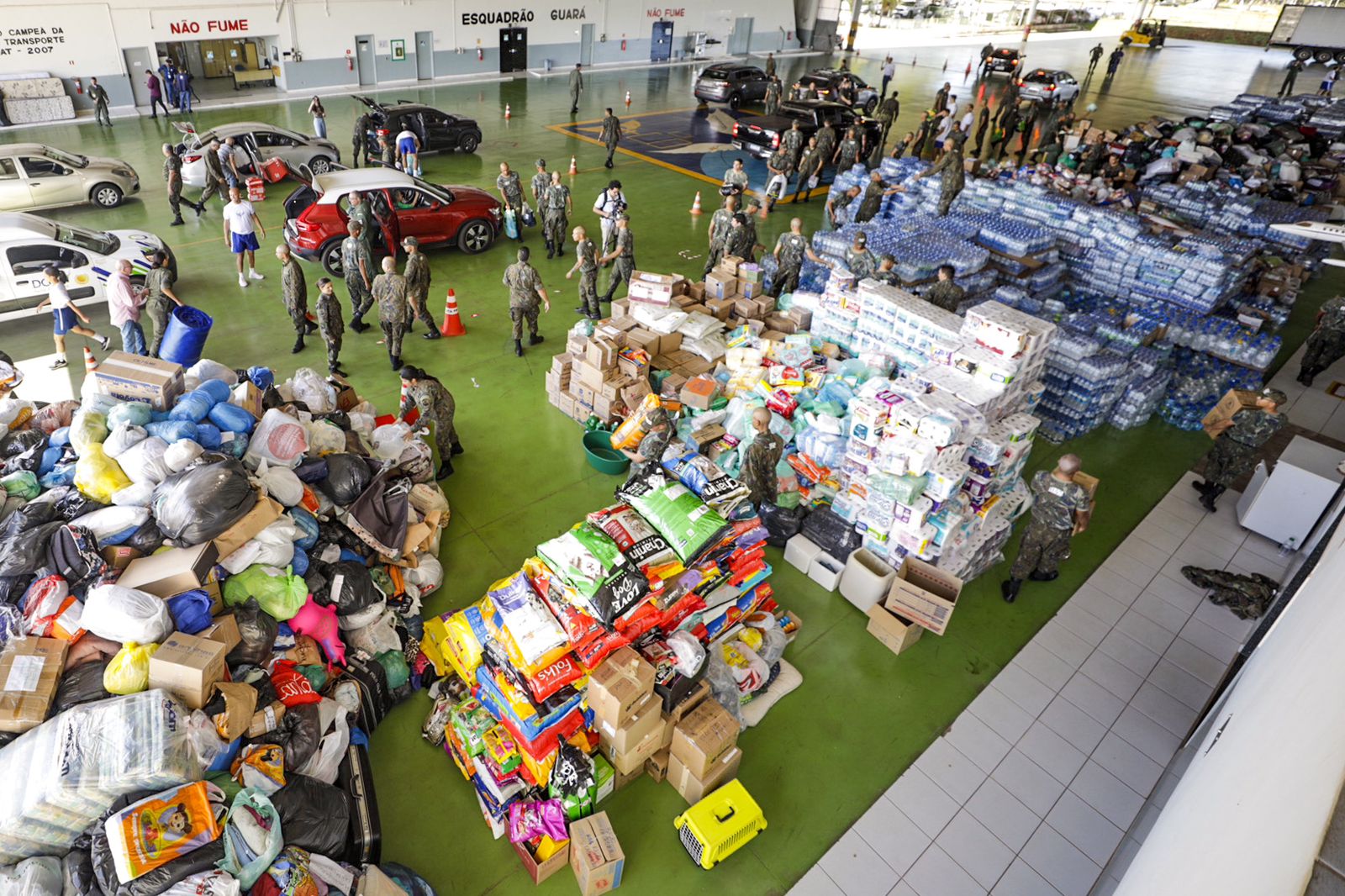Study reveals that human activity increases rainfall intensity
The ClimaMeter study reveals a 15% increase in rainfall intensity in Rio Grande do Sul due to human activity over recent decades. Brazilian state suffers from floods that hit the population hard. The climatologist emphasizes the essential role of the G20 in setting targets boosting the transition to more sustainable energy sources, and addressing global climate challenges through effective international collaboration.

In an exclusive interview with the G20 website, Climatologist Francisco Eliseu Aquino, Head of the Department of Geography at the Federal University of Rio Grande do Sul (UFRGS), affirmed that the unfolding tragedy in Southern Brasil has been intensified by the climate crisis. Aquino underscores that the frequency and intensity of extreme events such as floods and heatwaves are on the rise due to ongoing climate changes.
The climatologist emphasizes the pressing need for effective actions to mitigate the impacts of global warming and foster resilience facing environmental challenges. "Cities are grappling with a myriad of complex impacts," the climatologist highlights, discussing the severity of the floods occurring in the Brazilian state.
Francisco Aquino stresses the importance of incorporating climate issues into the global daily agenda. He presented data from a climate study released last Friday (10th) by researchers from ClimaMeter —an experimental platform developed by the team at the Climate and Environment Sciences Laboratory at the University of Paris-Saclay, France. The platform's objective is to swiftly analyze extreme events shortly after their occurrence.
Drawing from meteorological data spanning the past four decades, ClimaMeter scientists project that human influence has amplified rainfall intensity by 15% compared to its natural potential, with global warming being the primary catalyst, as noted by researchers. Aquino elaborates that extreme weather events are escalating due to the confluence of warmer oceans and a hastened atmosphere. He emphasizes the pivotal role of the Amazon Rainforest in regulating South America's hydrological system, underscoring the imperative for environmental preservation.
"We require coordinated global actions. Climate change is an undeniable reality," asserts Aquino, who also cautions against the economic risks of inaction, highlighting the increasing costs of rescue and recovery compared to investments in preventive measures. He urges countries to take responsibility and prompt action, stressing the need for effective global agreements. "We have a unique opportunity to expedite resilience and mitigate the impacts of climate change. The role of the G20 is highly relevant in this process and has the potential to facilitate goal-setting," Aquino concluded.
Drawing from meteorological data spanning the past four decades, ClimaMeter scientists project that human influence has amplified rainfall intensity by 15% compared to its natural potential, with global warming being the primary catalyst, as noted by researchers.
Extreme weather in the South and actions by the federal government

Entire cities have been submerged, people have died, many are missing and thousands are homeless. Brasil has responded to the crisis by initiating efforts to assist Rio Grande do Sul, by this calamity. Humanitarian aid is being mobilized from diverse sources, including actions from the Federal Government and civil society volunteers. This week, President Luiz Inácio Lula da Silva announced a BRL 50.9 billion (USD 9.92 billion) assistance package aimed at supporting families, rural laborers, businesses, and municipalities in Rio Grande do Sul. The specifics of these support measures for the population are outlined in a Provisional Presidential Decree submitted to the National Congress by the Brazilian president. The objective is to provide assistance to families, contribute to the state's reconstruction, support rural producers, and stimulate the economy. Planned actions encompass the expedited disbursement of the Bolsa Família (family assistance) program and cooking gas allowance, provision of low-interest credit, development of logistics and infrastructure projects, and prioritization of income tax rebates.
The Provisional Presidential Decree, which will allocate the funds, has been forwarded to the National Congress. It encompasses 12 economic initiatives targeting diverse demographics, benefiting more than 3.5 million individuals.
With a workforce comprising 27,000 individuals, including military personnel from the Armed Forces, over 70,000 rescues have already been performed, utilizing 340 boats, 11 planes, and 41 helicopters. Presently, more than 70,000 individuals are being accommodated in shelters, with 337,000 displaced. The calamity has claimed 126 lives, while 141 people remain missing. Additionally, 9,984 animals have been rescued from the floods. The impact extends to nearly 2 million people across 437 municipalities in Rio Grande do Sul, with the majority concentrated in the metropolitan region of the capital, Porto Alegre.
Ongoing fight against fake news
Adding insult to injury, opportunists have commenced disseminating false information regarding the rescue and aid efforts for the population of Rio Grande do Sul. Contrary to these fabrications, the Brazilian Federal Government has played a pivotal role in assisting the people of Rio Grande do Sul, with operations encompassing aerial rescues, evacuations, search and rescue missions, and food transportation. In response to the proliferation of misinformation, Minister Paulo Pimenta of the Social Communication Secretariat (Secretaria de Comunicação Social - SECOM) of the Presidency of the Republic of Brasil has dispatched a letter to Minister of Justice and Public Security Ricardo Lewandowski, urging investigation, identification, and accountability for those propagating falsehoods about the catastrophe.
"Everything is done to undermine the work and stop the operation from succeeding. We have to report this to the Federal Police and the Federal Attorney General's Office (Advocacia-Geral da União - AGU). We have to treat as criminals those who loot, those who steal at this time and also those who spread fake news with the aim of hindering those who are working," asserted the chief minister of the Brazilian SECOM.
As per the minister, fake news only serve to perpetuate a negative narrative surrounding the government's humanitarian aid efforts, disrupt political and social stability, and sow divisions within society.